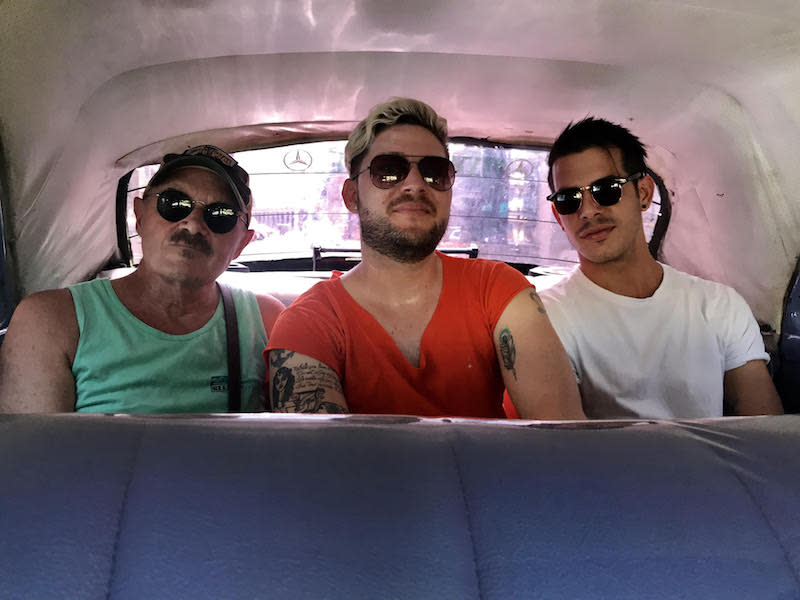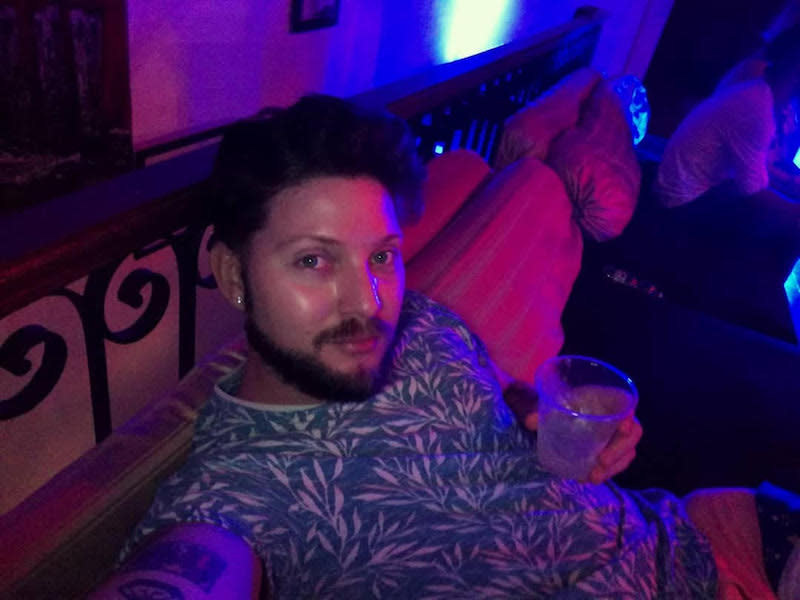We sat down with Andres who is based in Havana for a brief interview. As a local tour guide for Out in Cuba, he offers great perspective on visiting this one-of-a-kind Caribbean island.
When you first meet travelers from other countries what is it about your country that you feel is the most important to have them learn?
I think history and culture, because behind almost everything there's a story of how we grew and how we are now as a society. Even the Cuban cocktails are part of our history. So when you are drinking a Daiquiri I can´t help but to tell the story of who created the Daiquiri, when and how they made it popular, and of course, not only the past, but also the present because that conversation would be in a private restaurant. I’d follow with the explanation of life and work in Cuba nowadays and people's expectations. It's like a chain, one topic is related to the other, so speaking of history, I end up also speaking about how is life for the Cubans nowadays, what are the expectations, and sometimes there is also a cultural product to use as an example. And when I say history and culture I don't mean it like a class in school, it's like a peripatetic lesson during a whole stroll around town.
What do visitors tell you most surprises them about the Cuban culture?
About our happiness, or at least our enthusiasm. Of course it's understandable that we have a crazy sense of humor that's responsible for our survival. Once they take a big bite or a sense of what has happened, what's going on and what we want and need but still don't have, they just end up saying something like "but everybody looks happy and seem to be enjoying themselves; there is music all around, dancing, nobody's in a rush, there's art in every corner."

Why do you think it is important for you to share your life experience with travelers?
Because if I talk about my life and my hopes, people will have a sense of what it's like to be Cuban through the eyes of a young man that was born in the late ‘80s and grew up during that unique period and is experiencing the change of the country's heart. Also, they will be sharing with someone who didn't leave the island and believes in a better future, and writes, and paints and talks about it freely, without fears. I always say to myself, if I ever visit another country, I'd like to have someone talking to me about his or her life so I can have a better sense of the place. And also because at the end of the day, we are all the same and no matter what country or culture we are from, there are so many human aspects that never change, and from those common grounds we start the journey.
We know art is your passion. What can you share about art in Cuba that is the most impressive?
Tough one. Well, in Cuba like any other country (I guess) we have very good art and very bad art, but again, good and bad, it´s a matter of point of view. There are places like Fusterland and the Fábrica de Arte Cubano (the art factory is what I call it), which I think are a must-visit once in Cuba. Also, the Museum of Fine Arts and jazz clubs like Zorra y el Cuervo or the Jazz Café. I always try to keep my people away from the reguetón music, but the reguetón is like an invasion, it's all around, and that's an expression of the decadency and the crisis of values that we are experiencing as a country that failed trying to become everybody’s equal, which, for human nature itself, it's not possible. So I try to take people where the real Cuban music is, where the real highlights of the Cuban painting are, and to those spaces in between that are creating a little bit of history step by step, like independent artists and galleries, petit concerts of independent bands and performers. I wish they could see the plays but the language of theatre has too much Spanish and that's a barrier for most of the tourists.
Being a gay man in Cuba is...?
Not a big deal anymore. Years ago it was way different, but nowadays with the influence of the rest of the world through Facebook, Instagram, YouTube and social media in general, people are more open and more civilized. Also the National Center of Sexual Education has done its part and has brought to the television the topic and they've been talking about it, but of course, there is a long way ahead and we still have a lot of homophobia. Anyways you see a lot of gay couples in the streets, and gay bars (not that many and not that good, but...) and a lot of straight people hanging out with gay friends because it is also a step forward; it´s a civilized way of thinking—"the European mind," that's what they call it—so they embrace it as a little snobbish attempt of development. And that's something impressive, even for the tourists. I live my life with no fear, in fact, I'm very open about my gayness without being flamboyant and I'm not a fan of ghettos, I mean, gay places, I prefer those places where the gays and the straights coexist in harmony and have feedback and improve themselves by sharing ideas and points of view, and that's how I live my life. Also, I must confess that I´m lucky to have a very supportive family and friends, which helps a lot. But nowadays people in the closet are like a joke and everybody asks, why be in the closet at this point of our history? Cuba has never been this flexible, so we better take advantage of that and be ourselves.

From your experience what is the best day to spend with a visitor around Havana?
It depends on the visitor's interests, but from Thursday to Saturday is the best. There are more cultural options, more things going on and more people out.
What do you walk away with after meeting and spending time with visitors to your country?
Their point of view. I'm a writer and a journalist myself, so I love having different points of views to be able to compare and have a better opinion, description, perspective and sense of the things that are there every day for me and for that, sometimes are taken for granted.
The appreciation. As I said before, so many things you pass by every day without even noticing, and then, people from other countries make you look and appreciate, and that makes me want to learn more.
The cultural exchange. That's super important for me as a person who has never been out of Cuba. Remember, I'm Out in Cuba (just kidding). And even if I'd traveled before, it is always a great chance to talk to people from other countries and share experiences and knowledge.
And sometimes, the wonderful feeling of making a new friend, this je ne sais quoi that you get after saying goodbye, this tickling in the chest telling you that you are lucky for having met nice people, people you want to keep in your life in spite of the distance, and this sense of hope that you get from them, because yes, there are still good people in the world, and we are connecting with each other.
Out in Cuba is an IGLTA member and an LGBTQ+ owned business and travel to Cuba is both our passion and addiction. We understand the complexity of LGBTQ+ travel so you can be sure that when you arrive at your Cuban casa, you will be welcomed with open arms, a smile and a bed fit for two